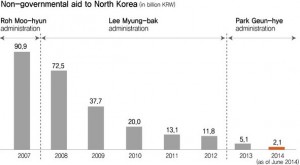According to the Daily NK:
The Ministry of Unification released its plans for the 2014 Inter-Korean Development Program on August 18th. 96 new enterprises are among the proposals stipulated in the report’s 30 articles.
The chief components of the plan include:
1. the establishment of a channel for consistent Inter-Korean dialogue
2. a solution for the Separated Families issue
3. provision of humanitarian aid geared towards North Korean citizens
4. adherence to international regulations through a cooperative exchange system
5. the restoration of national solidarity through sociocultural exchanges
6. expanding other ongoing inter-Korean economic collaboration projects
7. normalization of Kaesong Industrial Park operations and
8. tailoring refugee resettlement funds to individual defector needs.In a statement about the plan, a Ministry of Unification official said, “There is much significance in the fact that this proposal was a government-wide effort; a total of 24 administrative bodies came together to formulate these ideas and strategies.”
The comprehensive program also included detailed plans for the repair and renovation of the Kaesong-Pyongyang Expressway and the Kaesong-Sinuiju Railway. The premise of the official Inter-Korean Development Program has always been to improve overall conditions in the North while fostering better relations between North and South, but this most recent plan is the first to delineate detailed plans for large-scale investments in infrastructure.
Expansion of other inter-Korean economic collaborations were also outlined, such as:
1. Kaesong-Sinuiju railroad and Kaesong-Pyongyang railroad repairs
2. Imjin River flood prevention business
3. Food and Agriculture Organization [FAO] support of the North Korean fishing industry
4. proposals such as vitalization of inter-Korean shipping are included. In addition, depending on the situation, 5. they plan to gradually introduce reopening trade and commerce, resumption of basic economic cooperation and, launching of new businesses.A continued dedication to improving human rights in North Korea was also announced, starting with continued pressure on lawmakers to overcome the impasse and pass the North Korean Human Rights Act. The proposed law first appeared in 2005 but has since stagnated in the National Assembly due to failure by ruling and opposition parties to reach a consensus. Additional plans to increase support to private organizations advocating human rights in North Korea as well as striving to implement the recent recommendations by the UN based on the Commission of Inquiry [COI] findings on human rights in North Korea.
The South Korean government expressed its intentions to improve the quality of life for North Korean residents by increasing humanitarian aid and support. Most notably, the South vowed to separate political and humanitarian issues, ensuring that vulnerable social groups receive the support they need, regardless of tensions on the Korean peninsula.
Read the full story here:
Report: 2014 Inter-Korean Development Plans
Daily NK
Koo Jun Hoe
2014-8-19

